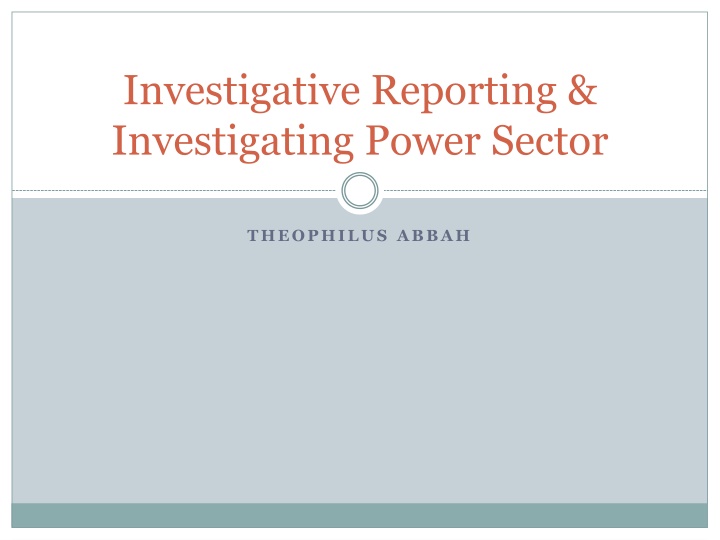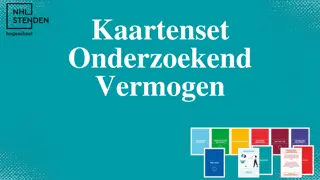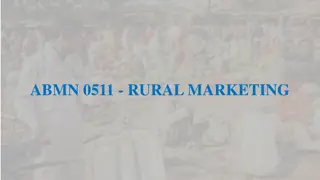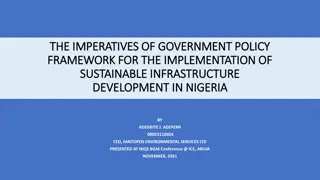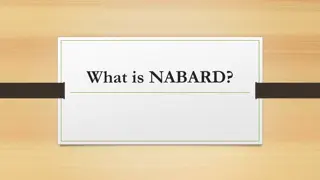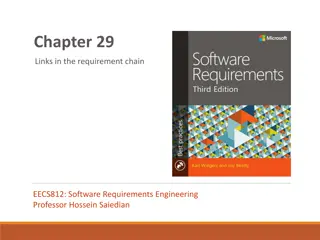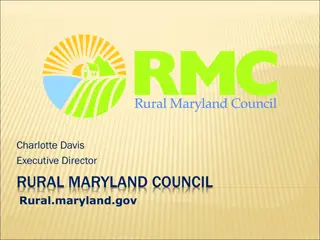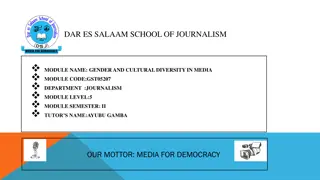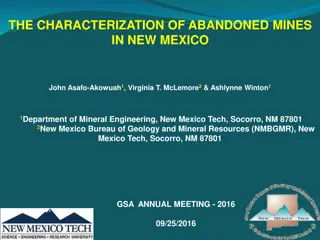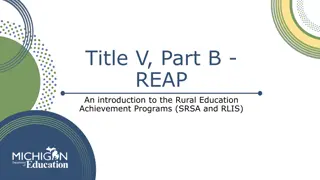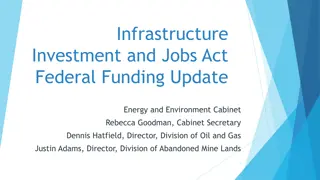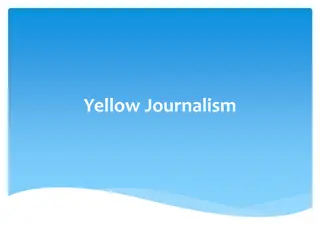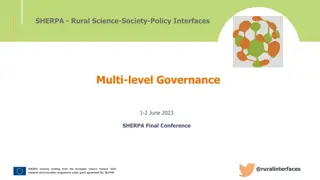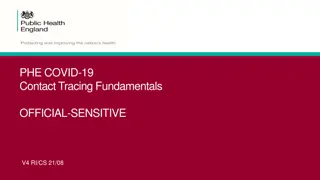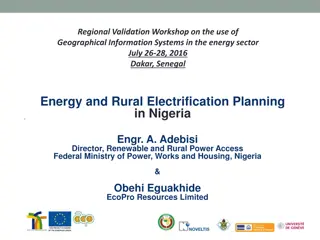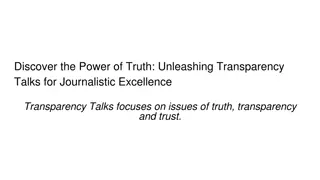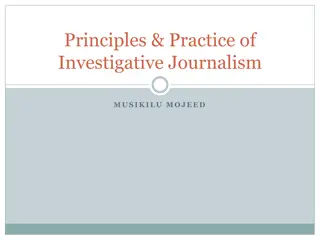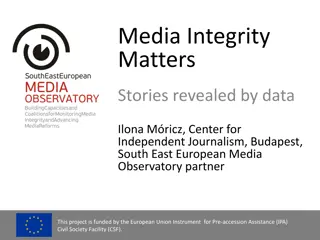Investigative Journalism: Tracing and Utilizing Abandoned Power Infrastructure in Rural Nigeria
The case study of Theophilus Abbah highlights the challenges posed by abandoned electricity infrastructure in rural areas of Nigeria, affecting both motorists and local communities. As an investigative journalist specializing in the power sector, the objective is to uncover the responsible parties behind the neglected transformer in Ogene Igah village, and ensure its activation for community benefit, in alignment with journalistic ethics and constitutional empowerment.
Download Presentation

Please find below an Image/Link to download the presentation.
The content on the website is provided AS IS for your information and personal use only. It may not be sold, licensed, or shared on other websites without obtaining consent from the author.If you encounter any issues during the download, it is possible that the publisher has removed the file from their server.
You are allowed to download the files provided on this website for personal or commercial use, subject to the condition that they are used lawfully. All files are the property of their respective owners.
The content on the website is provided AS IS for your information and personal use only. It may not be sold, licensed, or shared on other websites without obtaining consent from the author.
E N D
Presentation Transcript
Investigative Reporting & Investigating Power Sector THEOPHILUS ABBAH
A Case Study Theophilus Abbah hails from Ogene Igah village in Kogi State. He arrives home for a wedding ceremony. After dinner he hears an alarm. A vehicle travelling from Enugu to Abuja has rammed into an abandoned electricity transformer. The vehicle is badly damaged, but luckily the occupants are alive. The transformer has been at the spot in the village since 2008. It has never been powered. It was attracted to the place by a politician who can no longer be traced. As an investigative journalist with specialty in the electricity sector, what can you do to trace those who abandoned the transformer and ensure that it is put to use and stops being the nightmare of motorists and the people of Ogene Igah ?
Many faces of investigation? There are many kinds of investigators: Accident investigation loss adjusters Personal (licensed) Investigation Police investigators: fraud, crime scene; sexual crime; theft; kidnapping; assault; homicide; criminal defense Industry investigative panels Government investigative committees
Investigative Journalism Objectives Justifications Justifications Expose Wrongdoing Expose mismanagement Expose Waste Uncover corruption Uncover secrets what some persons want hidden Verification of claims Section 22 of the Nigerian Constitution empowers journalists to hold government accountable: Section 39(1): Every person shall be entitled to freedom of expression, including freedom to hold opinions and to receive and impart ideas and information without interference. (2) Without prejudice to the generality of subsection(1) of this section, every person shall be entitled to own, establish and operate any medium for the dissemination of information, ideas and opinion. It says: the press, radio, television and other agencies of mass media shall at all times be free to uphold the fundamental objectives contained in this chapter and uphold the responsibility and accountability of the government to the people
Democracy and Investigative Reporting Freedom of expression is a fundamental human right. It also underpins most other rights and allows them to flourish. The right to speak your mind freely on important issues in society, access information and hold the powers that be to account, plays a vital role in the healthy development process of any society. Article 19 of Universal Declaration of Human Rights says: Everyone has the right to freedom of opinion and expression; this right includes freedom to hold opinions without interference and to seek, receive and impart information and ideas through any media and regardless of frontiers.
Public Interest The public expects journalists to expose rot and corruption. Government, business organizations, lawmakers, traditional institutions are waiting for journalists to expose corruption. Publicity is the antidote to corruption
Public Interest It s a crucial duty of journalists to serve public interest by acting as a watchdog on government, business, education, health, environment, safety and other institutions.
Sources of Story Ideas Checking public information: When there is a press release about events, persons, policies, is it possible to dig deeper into the background of the people/issues? A tip off leak journalism Government documents: budgets, gazettes, annual reports, investigative panel reports, , etc
Sources of Story Ideas? Your own experience Experiences of friends and family Roadside radio gossips and anecdotes of street traders, taxi drivers and passengers Whistleblowers; complainants Local newspaper reports Follow-up stories Reading and surfing the web: what similar stories to the ones who have read can you do?
Investigative Reporting: A step-by-step approach An investigative story must be scientific. How? There is the story idea (from documents, radio, beer parlour, parliamentary debate, etc.) You form your hypothesis of what you need to find out and how. Intelligence: Having a foreknowledge of what you will find You study what others have written about the story you re working on (like Literature Review) Talk to Experts Go There: Enter the field to find out things for yourself. What did you uncover? What is new? What is the evidence of what you claimed to have discovered?
Investigating the Power Sector Show passion in the sector Have an intelligence network the beat is supposed to provide intelligence Read up the Acts and policy documents establishing the regulatory and other agencies: what are they supposed to do? Look for numbers contract sums, power generation, power distribution, tariffs, procurements, salaries, budgetary allocations, units of electricity, watts, locations of infrastructure Have a notebook of experts: the sector is opaque difficult to instantly understand like the oil sector. Collaborate with Civil Society Organisations.
A look are possible stories Metering: Why is it difficult? How could be done better? Are Nigerians getting value for the tariff they pay? How can they? Rural Electrification Project: Is it working Who is destroying gas pipelines? Are they being punished? How can the pipelines be better protected? Who are behind estimated electricity bills, and how can victims seek redress? In what state are the hydroelectric power stations: Kainji, Jebba, Shiroro, Zamfara, etc
